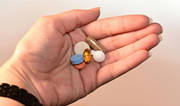
Side effects of popping pills: Why antibiotic resistance must be taken seriously
Posted 03 Dec 2024 | Source: https://www.news9live.com/
Antibiotic resistance is a global threat. The World Health Organization (WHO) has labeled it as one of the top ten public health challenges. The misuse, abuse, and overuse of antibiotics are among the major causes of antibiotic drug resistance. This has led to increased morbidity, hospital costs, and mortality among our patients. India has one of the highest rates of antimicrobial resistance in humans.
In an interaction with News9Live, Dr. Swati Rajagopal, Consultant – Infectious Disease & Travel Medicine, Aster CMI Hospital, Bangalore, spoke about the benefits of antibiotics and what happens when one pops those pills mindlessly.
Antibiotics can be used to treat bacterial infections and antibiotic resistance happens when the bacteria transform in response to the use of these medicines. The infection caused by resistant bacteria is difficult to treat when compared to infections caused by non-resistant bacteria. The misuse of antibiotics accelerates antibiotic resistance and leads to a lack of control over infection prevention.
Causes for Antimicrobial Resistance:
- Bacteria Breed: Bacteria are constantly growing. Some bacteria develop alterations that can make them resistant to antibiotics. These survive and multiply, passing on their resistance to future generations.
- Overusing Antibiotics: When one overuses antibiotics, we're creating the perfect breeding ground for bacteria. The antibiotics kill off the weak bacteria, leaving the strong, resistant ones to thrive.
- Antiviral for Antibiotics: Taking antibiotics for viral infections, like the common cold or flu, is not effective and can contribute to the rise of antibiotic-resistant bacteria.
- Antibiotics in Food: The use of antibiotics in animal agriculture can have widespread consequences. When antibiotics are used to treat animals or boost growth, it can lead to the development of antibiotic-resistant bacteria, which can then spread to humans through the food chain.
- Unhealthy Practices: Poor hand hygiene, lack of cough etiquette, and unhygienic food preparation can lead to the transmission of harmful bacteria and viruses.
- Vaccination: Not being updated with vaccinations and if you are traveling follow basic precautions to prevent and control infections.
Role of Medical Practitioners in the prevention and control of antibiotic resistance
Healthcare providers are committed to combating antibiotic resistance and ensuring the continued effectiveness of these vital medications. To prevent infections and minimize the need for antibiotics, healthcare providers maintain strict hygiene practices, including thorough handwashing and instrument sterilization. Additionally, they adhere to current guidelines, prescribing antibiotics only when necessary. Patients are informed about the proper use of antibiotics, the risks of misuse, and the importance of infection prevention measures, such as handwashing and vaccination. Educating patients about the responsible use of antibiotics is crucial, including the importance of completing the full course of treatment.
Role of Community in Control Spread of AMR
- Implementing robust infection prevention and control measures in healthcare settings to minimize the spread of antibiotic-resistant bacteria.
- Investing in innovative research to develop new antibiotics and alternative treatments.
- Educating the public about the effects of antibiotic resistance and the importance of responsible antibiotic use.
- Enforcing strict regulations to ensure the quality and appropriate use of antibiotics.
- Promoting responsible antibiotic use in animal agriculture to minimize the risk of antibiotic resistance.
Preventive Measures
- One should ensure that only a certified health professional prescribes antibiotics, and one should seek healthcare provider guidance before starting an antibiotic course.
- It is recommended to complete the course and not share it with others.
- It is important to prevent infections by frequently washing your hands, preparing food hygienically, and avoiding unnecessary contact with sick individuals.
- It is vital to follow WHO guidelines on safe food preparation such as separating raw food from cooked food, cooking food at prescribed temperatures, and using safe raw materials and water.
- It is also crucial to ensure that foods are not produced using antibiotics.
- Ensure safe sex and updated vaccinations.
Antimicrobial Resistance (AMR) is a global concern. It's a complex issue that requires a community-wide effort. As individuals, we play a crucial role in combating AMR. Practice good hygiene, such as frequent handwashing, to reduce the risk of infections. By working together, we can slow the spread of AMR and ensure a healthier future for generations to come.
